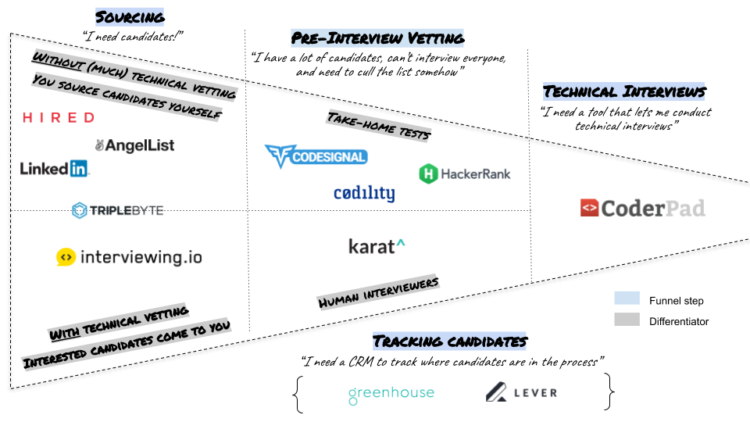I get a lot of questions about which hiring tools do what and how they’re different from each other, so I decided to draw an ugly, yet handy, picture (see below).

By the way, the reason this post has “unbundled” in the title is that many hiring tools, in part because we’re all on the VC funding treadmill, aspire to be more than they are and to ultimately be the one ring that rules them all, all the way from sourcing to interviewing to reference checks to onboarding to god knows what. So far, these attempts at grand unification, much like communism, have not panned out in practice. Though most tools claim to do more, most do more badly 1 but will try to upsell you on how they can solve all your hiring needs. Therefore, in the picture above, I’ve chosen the primary use case for each tool, i.e. the use case that each tool has actually gotten traction for (and the use case that I believe they’re actually good at).
And last thing. I run interviewing.io, which means that my take on other tools is indiscriminately biased. But, hell, it’s my blog, and I can say whatever I want… and having been in this industry for almost 10 years as an engineer and later as both an in-house and an agency recruiter and having spent the past 5 years running a successful hiring marketplace, I have acquired my prejudices the honest way, through laboratory experience. 2
All that said, a few of the choices I made in the picture probably require some explanation, so here goes…
I thought HackerRank also had an interview tool.
Yep, they do, it’s called CodePair. However, last I checked, in order to use it, you also had to buy other things, i.e. you can’t just use CodePair for technical interviews without buying in to the broader HackerRank ecosystem. And though CoderPad isn’t paying me for this, I think it’s a superior tool on many levels (and the one we actively chose to use inside of interviewing.io, forsaking all others). CodeSignal also has their own tool and Codility does as well, but that’s kind of the point of this post: tools unbundled. I’m listing the tools that have the differentiator in question as their core competency, not an add-on on some enterprise checklist.
Why is Triplebyte in the middle of the sourcing section?
Triplebyte recently pivoted to a new model. Instead of interviewing their candidates before sending them to customers, they now rely on a quiz, the results of which they use to annotate candidate profiles that recruiters can source from. Before that, they had their own interviewers conduct technical interviews with candidates and also had their talent managers match candidates to companies.
I thought Hired, AngelList, and LinkedIn had some kind of skills assessment/technical vetting?
They do, but last I checked it was an asynchronous test (rather than a human interviewer). In my opinion, asynchronous skills testing on these platforms has some value, but it’s quite limiting for a few reasons:
- Skills testing for candidates is optional on these platforms, which means that 1) not all profiles are vetted and 2) you get a good amount of selection bias for candidates without leverage taking them, e.g. juniors and people who need new visa sponsorship
- Much easier to cheat
- And of course asynchronous tests are lower fidelity than human interviewers (or at least the ones I’ve seen to date… but I want to be proven wrong)
I thought AngelList had interested candidates come to you?
They do. But like any jobs board, it’ll be noisy and probably full of candidates who don’t have much leverage, e.g. juniors/bootcamp grads and people requiring visa sponsorship.
Should I use take-home tests in my process?
As with many of my answers, it’s a matter of leverage. Candidates who have lots of options probably won’t spend time on take-homes. Candidates who don’t, either because they’re junior or because they don’t get a lot of recruiter outreach for other reasons, will.
Why are you so obsessed with leverage?
Because market forces rule everything around me.
Hey, if you do sourcing, why does your company literally have “interviewing” in the name?
The way we get candidates into our ecosystem is by offering them mock interviews. Then top performers from our practice pool can choose to use us for their job search. The name originally was meant to highlight the practice offering, but yeah, it’s confusing.
Is interviewing.io a good way to source candidates?
Yes. Yes it is.
CoderPad looks good but can improve their selection of data tools to include PL/SQL and TSQL. Not everyone uses Postgres (yet).
Clear, easy to understand graph. Thanks for posting and sharing your opinions!